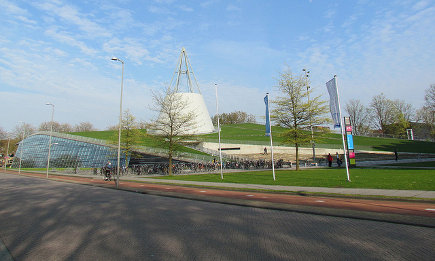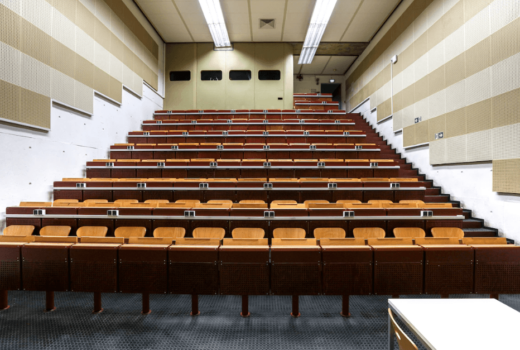Delft wil nú handelen

In zijn openingsrede voor het academisch jaar schetste voorzitter Dirk Jan van den Berg de strategie en kansen voor zijn TU. Met de regio komt de universiteit binnenkort met “a visionary agenda to establish Delft as one of the major innovation hubs in Europe.” Ook wil hij in Amsterdam “a technology institute for sustainable urban solutions” zien te stichten.
Opmerkelijk is dat de strategische alliantie met Leiden en de Erasmus Universiteit in zijn toekomstschets niet of nauwelijks (meer) aan de orde komt. Wel de stap naar edX. “At this very moment over 50.000 students have enrolled in our edX-courses on water management and solar energy. Imagine if only 1% opts for a masters degree program in Delft, we would receive an additional 500 master students. These are exciting developments and I am very proud that our leadership role in engineering education has been recognized by ScienceGuide.”
U leest het volledige betoog hieronder.
“This morning I returned home from Indonesia. There is one lasting impression of this trip which says it all: progress and ambition. In all countries in the far east, there is an overriding sense of optimism and drive for success. Fast growing mar-- kets offer tremendous opportunities for entrepreneurs and require lots of young people with a higher education. This is not only about mere volume, it is also about moving up in the value chain, to create higher added value.
The challenge for these high growth countries is to achieve their goals in a sustainable manner. In order to be successful high grade research and productive innovation are key, sustained by well trained engineers and top level researchers. Policies are geared to making it happen, high levels of investment in research and higher education are the common rule in the Far East.
This will have an important impact on what your future will look like. As an engi-- neer, trained at TU Delft, the whole world will be available to you and your career prospects will not be limited to the Netherlands or Western Europe alone. You will meet with other people in other countries, you will be offered opportunities your forebears here at TU Delft could only dream of. The Slip side of the coin is that you will find yourself in a tougher competitive environment. Hundreds of thousands of young people in India and China are completing their engineering studies this very month and they too will find a world with many opportunities.
This is not an issue to be fearful off. At TU Delft you will receive an excellent education in the engineering sciences. However, what has changed is that you need to take up the challenge of studying at Delft very serious. You can do this by simply taking up your study right from the very first day onwards. Your mindset should be to complete your studies within 6 years, the regular curriculum plus one year to proSit from the opportunities TU Delft offers, like the dream teams, student associations, student representative bodies and other activities.
Globalization is not just a labour market phenomenon or an expansion of your indi vidual opportunities. It is also the awareness that fate of peoples and nations are interlinked through global challenges which surpass national borders. Questions relating to food, environment, energy, water, health, poverty and security will not be solved by focusing on national policy approaches alone. Nor can these be solved by denying the strong interdependencies that exist between those challenges.
This sounds all very general but the point is that there are many engineering solutions to be found and explored. Engineering sciences will prove to be critical in addressing these global challenges. This is not a sort of triumph for the engineer in the sense that we can do away with lawyers, economists and psychologists. On the contrary, this will require an engineer who understands the context and interdependencies of the problem he or she is working on, and appreciates the value added multidisciplinarity can bring.
Yes, it is important to become an excellent professional. It is equally important to widen your scope and to increase your understanding on how every thing you do here in Delft fits in the broader perspective on how you see the world developing.
For this reason, students, you, will have to prepare for growing globalization. And not only you, but so does the university. TU Delft is one of the top 20 leading universities in the engineering sciences and our objective is to maintain this position for the next 20 years to come and beyond. This requires initiatives in all areas relevant to the main purposes of a university: education, research and innovation.
In education we will have to further strengthen our Graduate School framework, in order to provide for a well structured third cycle education program, attractive to national and international PhD candidates. While the full potential of on line education is yet to be unleashed, we will invest in order to guarantee TU Delft’s forefront position in this newly developing delivery of top class master programs.
At this very moment over 50.000 students have enrolled in our edX-courses on water management and solar energy. Imagine if only 1% opts for a masters degree program in Delft, we would receive an additional 500 master students. These are exciting developments and I am very proud that our leaderships role in engineering education has been recognized by ScienceGuide.
In research we make choices based on long term strategic thinking through a continuous assessment of our research portfolio in terms of its (promised) success, its topicality and its adequacy. It is important to understand that research outcomes may take years to produce results and requires in depth investment in top quality researchers and facilities. Universities are not consulting firms and it remains a challenge to align time horizons in industry and academic research institutions.
Nonetheless, when there are opportunities to engineer research into potential applications, we expect industry and policy makers to join in and to be part of the big innovation adventure. As we speak we are working on proposals to set up an engineering research institute to solidify the outcomes of our research on quantum computing. If we want to grab a lead on these game changing developments, we, university, private sector and government will have to act now. We will continue to further build up our international network of Joint Research Centers in China, Brazil and, possibly, in the near future. India. In addition, we will better profile our research efforts through the creation of Delft Institutes combining research activities in the different faculties, relaying to one particular research domain.
While it is crucial to discuss TU Delft’s future with an international reference in mind, one should never deny its roots and history. In the case of TU Delft, we are firmly rooted in the Netherlands and although the number of international students is rising, the vast majority of our students are Dutch nationals. We are strongly committed to making an important contribution to the Dutch economy through our education and through our research. We are immensely pleased with the growing interest of young people to engage in the field of engineering. Especially this year the numbers are quite dazzling.
The faculty of mechanical engineering will receive almost 600 freshman students this year. At these numbers, regretfully, we will have to take measures to guarantee the quality of our education. This means that next year we will have to limit enrollment in our mechanical engineering faculty to 600 students. We are fully aware of our responsibility to educate young men and women to become engineers, especially when the economy shows an increasing demand for engineers. However to increase capacity requires time and money, in order to attract high level educators and to expand our facilities for teaching and practicing. It takes time, for we will never compromise on our educational content and quality.
At this stage, really, it is a choice between quantity and quality. Within the framework of the so called prestatieafspraken, there is a strong focus on reducing the drop out rate and on streamlining curricula in order to provide for a smoother program delivery. In the end it is our aim to deliver more engineers within a reasonable time frame.
The tree of internationalization can only grow as high as its roots will permit. We believe it really necessary to shape and to contribute to the local eco system in Delft and in the Randstad. After all it is the local / national ecosystem that will determine the strength of the roots. The high potential of Delft as a an innovation hub will have to be placed on the map more prominently through active development of Technopolis as a full fletched science park. The educational offerings in engineering sciences at all levels will have to be made more visible and better aligned. The connection with the local business community will have to be refreshed and expanded in education and training as well as in research and innovation. This will be one of our main priorities.
This year, the TU Delft, in corporation with the municipality, will launch a visionary agenda to establish Delft as one of the major innovation hubs in Europe. Our strengthened cooperation with Leiden University en Erasmus University Rotterdam will also serve to create a strong research and education base in the Netherlands. Along the same line of thought we hope to be successful in our bid to create a technology institute in Amsterdam for sustainable urban solutions.
This boils down to the theme of my speech: think global respecting local. On the one hand TU Delft will have to be a player in the international arena, in Europe and in the rest of the world. On the other hand we will have to be mindful of our local ecosystem. You will be confronted with similar dilemmas.
On the one hand you will be faced with global challenges and global competition, requiring a truly broad worldly perspective. On the other hand you will have to appreciate what TU Delft can offer you in terms of education as well as a rich array of other opportunities in order to prepare yourself for assuming leadership roles in your future professional live. Therefore: Think global respecting local.”
Meest Gelezen
Wederom intimidatie van journalisten door universiteit, nu in Delft
‘Burgerschapsonderwijs moet ook verplicht worden in hbo en wo’
Extra geld voor bètafaculteiten is daar nooit terechtgekomen
Raad van State: laat taaltoets nog niet gelden voor hbo-opleidingen
Vrouwen houden universiteit draaiende, maar krijgen daarvoor geen waardering



